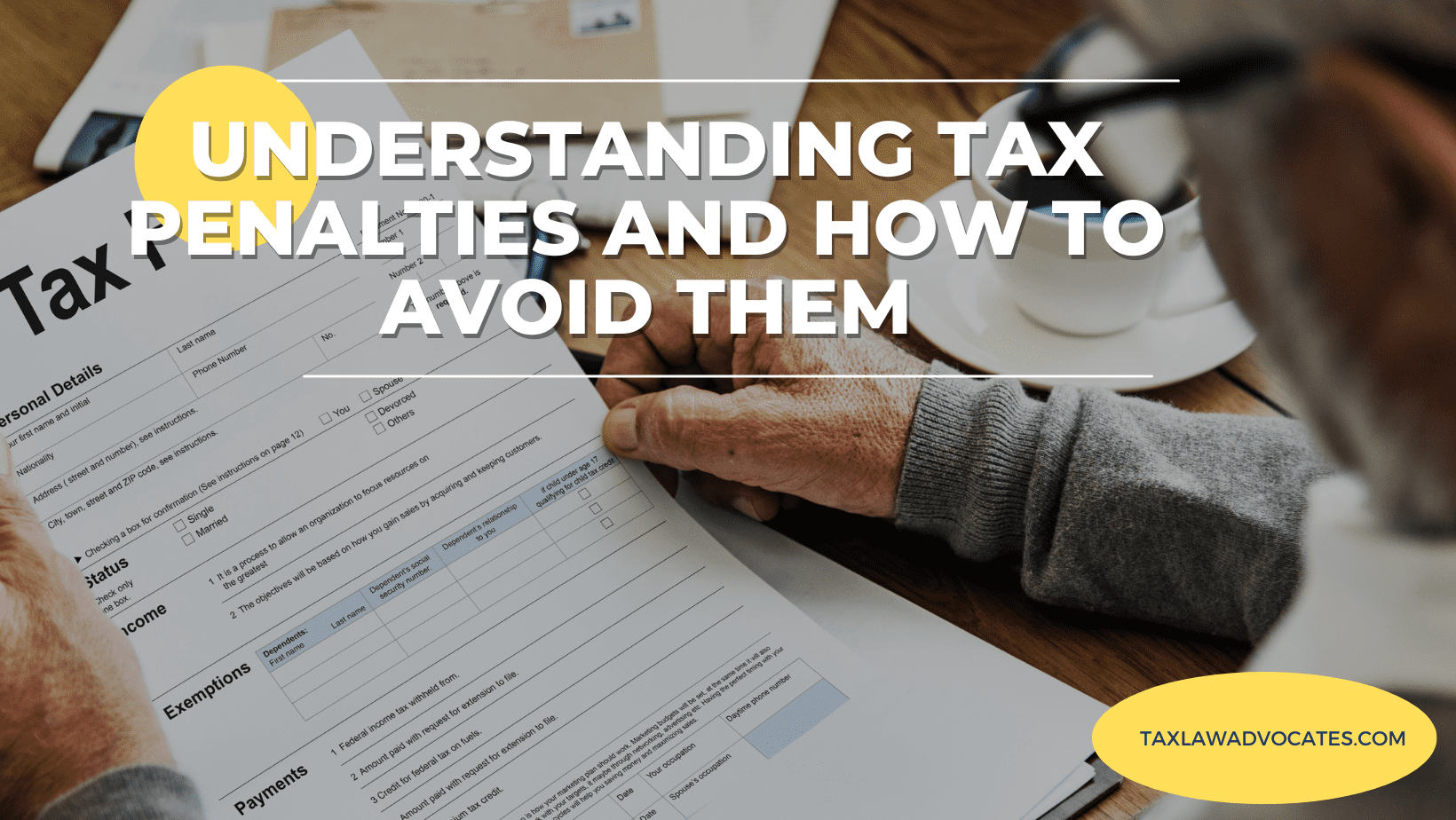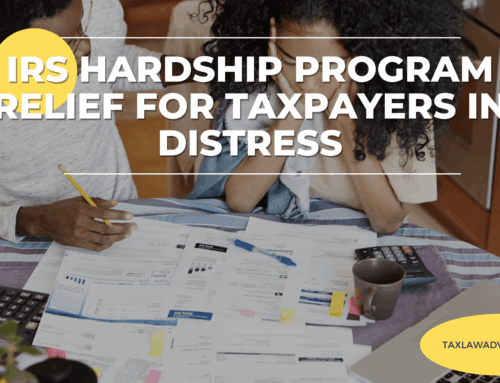Tax penalties can quickly turn an already stressful situation into a financial nightmare. Whether due to late filing, underpayment, or incorrect information, penalties imposed by the IRS can add up fast, making tax debt even more difficult to manage. However, many taxpayers don’t realize that there are ways to reduce or even eliminate these penalties through proactive tax planning and professional intervention.
At Tax Law Advocates, we specialize in helping taxpayers navigate IRS penalties, negotiate penalty abatement, and develop strategies to stay compliant. If you’re facing tax penalties or want to avoid them in the future, call us at 855-612-7777 or visit taxlawadvocates.com for expert assistance, and make sure to visit the official IRS Penalities page to learn more.
Common Tax Penalties and Their Consequences
The IRS imposes penalties for various reasons, including late payments, filing errors, and underpayment of estimated taxes. Understanding these penalties can help you take preventive measures and avoid unnecessary fines.
1. Failure to File Penalty
If you fail to file your tax return by the due date, the IRS charges a failure-to-file penalty. This penalty is 5% of your unpaid taxes per month, up to a maximum of 25% of the total tax due.
- If your return is over 60 days late, the minimum penalty is either $485 or 100% of the unpaid tax, whichever is less.
- Filing an extension can help avoid this penalty, but an extension to file does not extend the time to pay.
💡 How to Avoid It:
- File your tax return on time, even if you can’t pay the full amount owed.
- Request an extension before the deadline to avoid unnecessary penalties.
2. Failure to Pay Penalty
If you do not pay your taxes by the due date, the failure-to-pay penalty applies. The penalty is 0.5% of the unpaid tax per month, up to a maximum of 25%.
- If you file on time but do not pay the full amount, the 0.5% penalty applies instead of the higher 5% failure-to-file penalty.
- If you have both penalties (failure to file and failure to pay), the failure-to-file penalty is reduced to 4.5% per month, and the failure-to-pay penalty remains at 0.5%.
💡 How to Avoid It:
- Pay as much as you can by the due date to minimize interest and penalties.
- Set up an IRS installment agreement to stop further penalties.
3. Accuracy-Related Penalty
If you make errors on your tax return or fail to report all your income, the IRS may charge an accuracy-related penalty of 20% of the underpaid tax.
Common reasons for this penalty include:
✔ Understating income
✔ Claiming deductions or credits you don’t qualify for
✔ Negligence in preparing your return
💡 How to Avoid It:
- Double-check your return before filing.
- Keep accurate records of income and deductions.
- Work with Tax Law Advocates to ensure compliance.
4. Underpayment of Estimated Tax Penalty
Self-employed individuals, business owners, and others who don’t have taxes withheld from their income may be required to make quarterly estimated tax payments. If these payments are insufficient, the IRS may impose a penalty.
- The penalty is calculated based on the amount underpaid and the period it was underpaid.
- Safe harbor rules: You can avoid this penalty if you pay at least 90% of your current-year tax liability or 100% of the prior year’s tax (110% if your AGI is over $150,000).
💡 How to Avoid It:
- Make estimated payments on time (April 15, June 15, September 15, and January 15).
- Use the IRS Withholding Calculator to adjust withholding and avoid penalties.
5. Trust Fund Recovery Penalty (TFRP) for Business Owners
If a business fails to pay payroll taxes, the IRS can hold owners, officers, or employees personally responsible for the unpaid taxes. This is called the Trust Fund Recovery Penalty (TFRP) and is one of the harshest penalties the IRS can impose.
- The IRS can seize personal assets of those held responsible.
- Business owners who divert payroll tax funds for other expenses are at high risk of this penalty.
💡 How to Avoid It:
- Always remit payroll taxes on time.
- Set up a tax compliance plan with Tax Law Advocates.
How Interest Compounds on Tax Penalties
When you owe tax penalties, interest starts accruing immediately.
- Interest on unpaid taxes compounds daily until the balance is paid in full.
- The interest rate is determined quarterly based on federal short-term rates.
- The longer you wait to address your tax debt, the more penalties and interest accumulate.
🔍 Example:
If you owe $10,000 in taxes and fail to file or pay, within a year, your total balance could exceed $12,500 due to penalties and interest.
How to Reduce or Remove IRS Penalties
The IRS allows for penalty abatement in certain situations, meaning penalties may be reduced or eliminated if you meet specific criteria.
1. First-Time Penalty Abatement (FTA)
If you have a clean compliance history for the last three years, you may qualify for penalty abatement for failure to file or pay penalties.
2. Reasonable Cause Penalty Abatement
If you can show that circumstances beyond your control prevented you from complying with tax laws, the IRS may remove penalties. Acceptable reasons include:
✔ Natural disasters
✔ Serious illness
✔ Death of a family member
✔ Unavoidable absence (military deployment, hospitalization)
3. Offer in Compromise (OIC)
If you cannot afford to pay your tax debt, you may qualify for an Offer in Compromise, allowing you to settle for less than you owe.
4. Currently Not Collectible (CNC) Status
If you cannot pay due to financial hardship, the IRS may pause collection efforts, stopping penalties and interest accrual.
5. Installment Agreements
Setting up a monthly payment plan can stop further penalties and interest from adding up.
How Tax Law Advocates Can Help
Navigating tax penalties can be overwhelming, but Tax Law Advocates specializes in reducing penalties and negotiating with the IRS to find solutions that work for you.
✔ Penalty Abatement: We’ll review your case and file for penalty removal if eligible.
✔ Installment Agreements: We negotiate affordable payment plans to stop further penalties.
✔ Offer in Compromise: If you qualify, we can help you settle your tax debt for less.
✔ IRS Dispute Assistance: If you’ve been unfairly penalized, we fight for your rights.
Don’t let tax penalties pile up—take action today!
📞 Call Tax Law Advocates at 855-612-7777
🌐 Visit taxlawadvocates.com for expert tax relief services
Get ahead of tax penalties now and secure your financial future! 🚀






